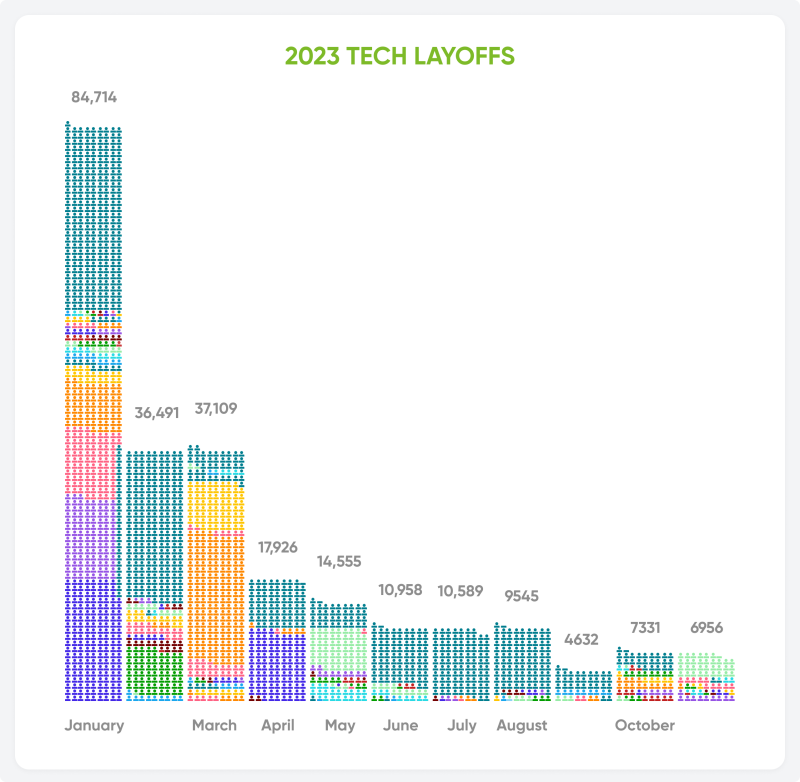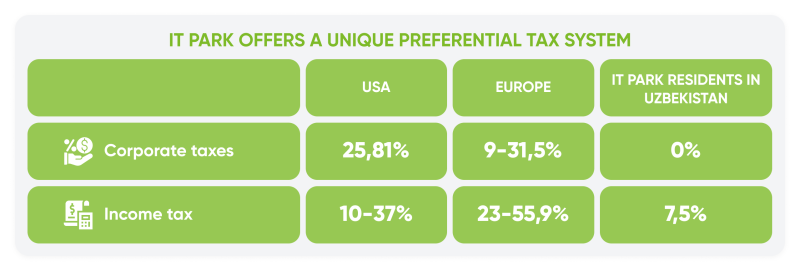
Opportunities of Uzbekistan’s IT market for increasing corporate profit and adopting new technologies
In recent years, the global economy has undergone a series of shocks: initially, corporations adapted to new paradigms amid the widespread lockdown due to the coronavirus pandemic. Subsequently, with the easing of quarantine measures, economic agents once again had to readjust their processes in the face of an accelerating economy. However, the new conditions are complicated by the fact that during the pandemic, central banks issued unsecured volumes of money, thereby fueling inflation and hastening the onset of a recession.
Current macroeconomic conditions pose challenges to all players, including IT corporations, which, despite the complexities, strive to create and adopt innovative products. In this regard, companies are compelled to seek unconventional solutions, and the IT outsourcing market in Uzbekistan may emerge as one such option.
Current Challenges in the IT Sector
Expensive Workforce
During the pandemic, technology companies actively expanded their staff, adapting to societal needs. New specialists also worked on innovative products planned for market release during the economic recovery. Companies, in the competition for top talent, raised salary rates, ultimately leading to industry overheating: organizations inflated bloated labour force at a high price. By the end of 2022, a reverse process began, specifically, mass layoffs that persisted into this year.

In addition, the layoffs are driven by the following reasons:
- Corporations are preparing for a recession in the global economy.
- Prioritization of directions in industry development; for instance, companies are currently engaged in a race in AI technologies while simultaneously optimizing other areas.
- Boards of directors and corporate investors demand the preservation of asset profitability, adhering to the thesis that layoffs increase profits. Начало формы
Staff Shortage
Paradoxically, relative to the previous thesis, HR departments in IT are still actively seeking specialists. The deficit lies in highly qualified professionals capable of introducing new ideas into companies and willing to master innovative and highly demanded directions. The shortage of such professionals can impede project development and restrict company growth, ultimately affecting low competitiveness compared to other leading players.
Increase in Operational Expenses
In addition to labor costs, companies have experienced an increase in operational expenses: office rent is rising, the cost of services from subcontracting organizations is escalating, and credit rates are also on the rise — all consequences of rising inflation and central bank interest rates.
Despite the current dynamics in the global economy, companies remain in competition to explore innovative directions and transition to a new technological paradigm. IT players understand that the leaders in this race will ultimately reap the greatest benefits. Therefore, enterprises strive to maintain a balance between economic challenges and the aspiration to shape and conquer new markets. The serene IT harbor in Uzbekistan may serve as one of the indicators of this balance.
IT Outsourcing in Uzbekistan as a Solution for Adapting to Challenges
Low Labor Costs
Uzbekistan is undergoing a transitional economy and falls under the category of developing countries. Consequently, the country still possesses a sizable labor market with relatively cheap labor compared to developed economies. The numbers speak for themselves: in the USA, the average salary for an IT professional is $87,000 per year, in Europe, it’s around $60,000 per year, while in Uzbekistan, it is $10,000 per year. Thus, the labor cost for an IT specialist in Uzbekistan is more than 5 times lower compared to the Western market.

Opportunities for Training Highly Qualified Personnel
Unlike other developing countries, Uzbekistan, thanks to past economic formation, has created conditions for accessible and high-quality education. With a population of 36 million citizens, the country boasts a 100% literacy rate. In addition to natural sciences, the younger generation in schools is actively engaged in studying IT disciplines, as well as foreign languages. Currently, more than 5 million citizens are proficient in the English language.
Considering these opportunities, foreign universities are entering the Uzbekistan market to train modern specialists. Currently, around 60 IT universities operate in the country, producing over 29,000 highly qualified professionals annually.
In turn, IT Park actively participates in the training process alongside foreign companies that have decided to establish their presence in the country. For instance, in partnership with EPAM Systems, IT Park University was established, educating around 400 students. This allows foreign companies to train personnel in accordance with relevant requirements in collaboration with IT Park.
Advanced Infrastructure and Low Operational Costs
Infrastructure in Uzbekistan is well-developed: cities are electrified, and internet coverage spans 99% of the Republic’s territory, with tariff costs for internet connection considered among the lowest in the world. As a result, the country boasts 31 million internet users.
IT Park residents benefit from preferential tariffs for office space, making the presence of foreign companies advantageous in terms of operational costs.
Low Taxes
Another advantage of residency in IT Park is the preferential tax system. Specifically, companies are eligible for zero rates on corporate, social, property taxes. Additionally, residents are exempt from VAT, and the income tax is only 7.5%, in contrast to the standard 12%.

Sources:
- Corporate Tax Rates around the World, 2022
- 2023 Corporate Income Tax Rates in Europe
- Top Personal Income Tax Rates in Europe
- 2023-2024 Federal Tax Brackets and Income Tax Rates
Low tax rates enable companies to reinvest earnings in their operations, expanding staff and production capacities. Thus, companies can not only optimize expenses but also conquer new markets, such as in the competitive race to adopt AI technologies.
Companies gain access to the local market and expand into neighboring regions
Uzbekistan is the most densely populated country in Central Asia with high potential for industrial and technological development. Industrial groups producing in the country also require modern information and technological solutions. Over time, this demand will only increase.
Through IT Park, cooperation between industrial manufacturers and software companies can be simplified. Such mutually beneficial collaboration will positively impact the development of domestic producers as well as IT product suppliers. IT Park also aims to establish a foundation for expansion into neighboring markets where capital-intensive corporations require modern IT products.
Conclusion
History has repeatedly confirmed in practice the effectiveness of transferring production from developed countries to emerging markets. In the 1970s and 1980s, partial migration of manufacturing capacities to Southeast Asia enabled developing countries to integrate into the global economy and corporations to obtain massive at low costs.
In the 21st century, the relocation of production in the IT sector becomes relevant. The tranquil harbor of Uzbekistan’s IT market enables companies not only to survive the transformations in the global economy but also to acquire modern solutions with low expenses. Over 400 foreign-capital companies have already experienced the advantages of residing in Uzbekistan under the IT Park residency.
Information about the author:
Otabek Arzykulov — systems analyst, author of analytical articles for the publication “Economic Review”, and scientific articles on the digital economy, developed technologies and methodologies for Gazpromneft (Russia).
2023-12-26